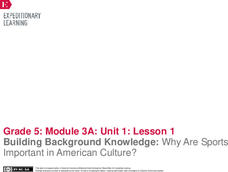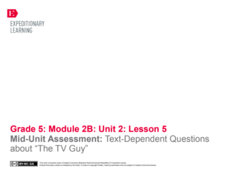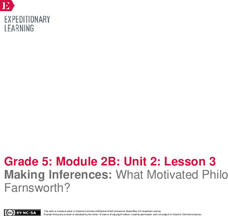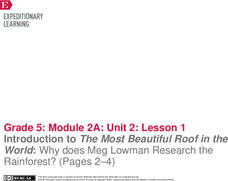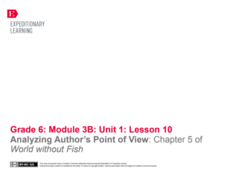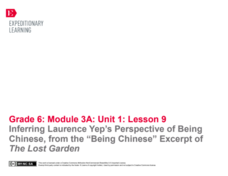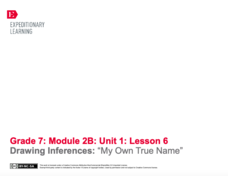EngageNY
Introducing Promises to Keep and Drawing Inferences: Who Is Jackie Robinson and Why Is He Important? (Promises to Keep, Pages 6–7)
Scholars take a picture walk through the book Promises to Keep: How Jackie Robinson Changed America. They make predictions and complete a Notice/Wonder/Inference note catcher. They then define and analyze words on pages six and seven of...
EngageNY
Building Background Knowledge: Why Are Sports Important in American Culture?
What makes sports so special to many Americans? Scholars ponder the question as they participate in a gallery walk, immersing themselves in images and texts about sports. Pupils also complete a vocabulary strategies anchor chart to...
EngageNY
Mid-Unit Assessment: Text-Dependent Questions about “The TV Guy”
Say hi to the TV guy. Readers finish their mid unit assessments by reading The TV Guy and answering text-dependent questions. Learners complete multiple choice as well as short and long answer questions pertaining to comprehension,...
EngageNY
Making Inferences: What Motivated Philo Farnsworth?
Learners continue their work in The Boy Who Invented TV by examining pages 14-17. They work together to determine the gist of the section during a first read then complete a second read to make inferences, create a summary, and define...
EngageNY
Making Inferences: What Motivated Philo Farnsworth?
Turn on the tube. Learners take a look at pages 10-13 of The Boy Who Invented TV. They work in groups and complete a first read to determine the gist of the section. They then reread the pages to make and revise previous inferences and...
Academy of American Poets
Teach This Poem: "In the Next Galaxy" by Ruth Stone
Imagine what life might be like in a different galaxy. That's the challenge young scientists take on in a warm-up activity designed to prepare them for a close reading of Ruth Stone's poem "In the Next Galaxy." After class members share...
University of British Columbia
Pondering Poetry and Playing with Words
First-year High school scholars explore the world of poetry with an 11-lesson unit that examines a range of poetry forms and tries their hand at crafting their own poems. Young poets then collect their work in a portfolio that they...
Angel Island Immigration Station Foundation
How Do Pictures Tell the Story of Angel Island?
Young historians learn more about the history of Angel Island Immigration Station through their analysis of primary source images. Guided by a list of inferential questions, scholars learn how to make and record observations on a...
EngageNY
Introduction to The Most Beautiful Roof in the World: Why does Meg Lowman Research the Rainforest? (Pages 2–4)
Let's go for a walk. Scholars take a book walk through the text The Most Beautiful Roof in the World and create an anchor chart to list the features of informational text. They then take a close look into the character Meg Lowman by...
EngageNY
Making Inferences About Informational Text: Science Talk on How My Insect Contributes to the Rainforest Ecosystem
We need to talk. Learners participate in a science talk by discussing the idea of how insects are important to the rainforest. They record notes about their conversations as they talk. For homework, pupils add to their field journals.
EngageNY
Analyzing Author’s Point of View: Chapter 5 of World without Fish
That's an interesting perspective. Scholars read chapter five of World without Fish and use an Author’s Point of View graphic organizer to determine the author's perspective. In triads, they highlight words that support the author's...
EngageNY
Inferring Laurence Yep’s Perspective of Being Chinese, from the “Being Chinese” Excerpt of The Lost Garden
It's all about perspective! Using the resource, scholars read a third excerpt from Laurence Yep's autobiography, The Lost Garden. As they read, individuals complete graphic organizers using clues from the text to infer the author's...
EngageNY
Introducing The Lost Garden and Finding Evidence of Laurence Yep’s Perspective on What It’s like to Fit into Another Culture on Pages 66– 67 of Dragonwings
How does culture shape perspective? Pupils consider the question as they read an excerpt from Laurence Yep's autobiography, The Lost Garden. Using a graphic organizer, they gather textual evidence and make inferences about the author's...
EngageNY
Inferring Laurence Yep’s Perspective on the Police, from the Crime in the Neighborhood Excerpt of The Lost Garden
Gist get to the point! Pupils read another excerpt from The Lost Garden, author Laurence Yep's autobiography. Working with partners, scholars annotate the text to look for the gist and record unfamiliar vocabulary in their word catchers.
EngageNY
Launching the Module: Quotes about the Middle Ages
Pick a corner. Scholars receive a quote about the Middle Ages and then participate in a four corners activity by choosing a corner pertaining to their quotes. They then work in groups of three to discuss the bold words in their quotes....
EngageNY
Reading Closely to Build Background Knowledge: “Myths and Legends”
That is a myth! Scholars take a look at Greek myths referenced in The Lightning Thief. As learners listen to stories in Myths and Legends, they imagine the sights and sounds described. Pupils then talk with partners about specific words...
EngageNY
Mid-Unit 1 Assessment: Making Inferences from Percy
Time to shine! Scholars show everything that they have learned so far in the unit by completing a mid-unit assessment. In the assessment, they discuss the gist of sections of text from The Lightning Thief and inferences they made about...
EngageNY
Inferring about Character: Close Reading of The Lightning Thief (Chapter 3)
Stick it to them! Scholars work to write the gist of sections of text on sticky notes and place them in chapter three of The Lightning Thief. They then share what they wrote with classmates in their triad. The group reads selections of...
EngageNY
Inferring about Character: Getting to Know Percy (Chapters 1 and 2)
What a character! Scholars look at two chapters in The Lightning Thief to make inferences about the character Percy. They record both the character's challenges and responses. Learners then work in their triads to discuss the gist of...
EngageNY
Meeting the Main Character: Launching The Lightning Thief (Chapter 1)
Three is company! Scholars work in groups of three to discuss quotes from the first pages of The Lightning Thief. Each group records their thinking on the paper of the quotes before talking about Percy's character using the Making...
Teaching for Change
Selma in Pictures: Socratic Seminar
Photographs from the freedom movement in Selma, Alabama serve as the basis of two Socratic Seminars. Class members prepare for the seminars by closely observing the images, form a hypothesis, and use evidence from photo to support a...
C-SPAN
Choice Board: Expressed and Implied Powers
Article 1, Section 8 of the United States Constitution expressly lists powers given to Congress. Over the years, lawmakers have expanded the enumerated powers to include powers implied by the list. To better understand the significance...
Teaching Tolerance
Using Photographs to Teach Social Justice | Supporting Social Border Crossings
A lunch-time activity encourages pupils to step out of their usual lunch bunch and connect with someone new. To begin, individuals examine a group photograph and identify what they believe is the gender, race, religion, and sexual...
EngageNY
Drawing Inferences: “My Own True Name”sl.7.1
How much are you worth? Scholars read text dependent questions, and discuss how the text relates to self worth. They then work with partners by having written conversation to make inferences about the text. For homework, pupils correct...



